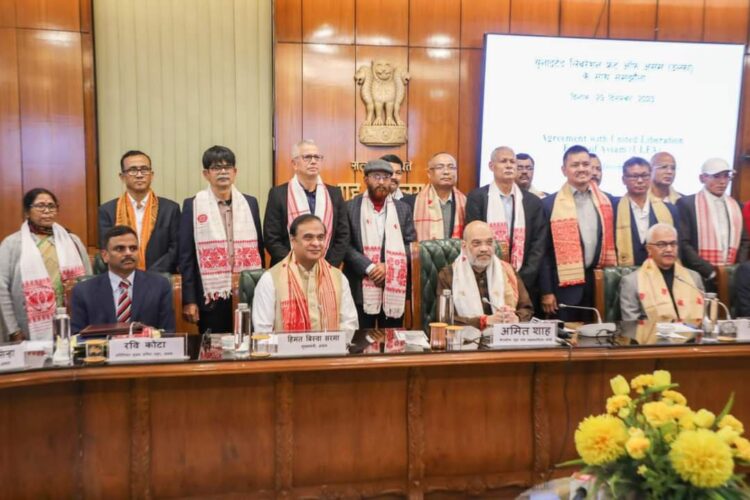In a historic leap towards enduring peace, the pro-talks faction of the United Liberation Front of Asom (ULFA) has forged a transformative alliance with the central and Assam governments, formally sealed through a tripartite peace accord on December 29. This momentous occasion unfolded in the presence of dignitaries such as Union Home Minister Amit Shah and Assam Chief Minister Himanta Biswa Sarma, marking the initiation of a promising chapter for the northeastern state.
Union Home Minister Amit Shah, addressing the historic signing, described it as a golden day and a turning point for the people of Assam. He underscored Prime Minister Modi’s unwavering commitment to narrowing the gap between Delhi and the Northeast since 2014. Shah emphasised the government’s approach of engaging in open-hearted dialogues with insurgency groups, noting that under Modi’s leadership, nine peace and boundary dispute accords have been signed in the Northeast over the last five years. These efforts have resulted in the restoration of peace across a significant portion of the region, with over 9000 armed insurgents laying down their weapons.
Since the inception of the Modi government in 2014, Assam has witnessed a remarkable decline in violent incidents by 87 percent, deaths by 90 percent, and kidnappings by 84 percent. The symbolic surrender of over 8200 ULFA cadres in Assam alone signifies the dawn of a new era characterised by peace and stability. The Ministry of Home Affairs, Government of India, is set to create a time-bound program to address ULFA’s demands, complemented by the establishment of a monitoring committee.
The government has committed to an extensive package and a myriad of development projects for Assam’s holistic progress. Chief Minister Himanta Biswa Sarma applauded PM Modi’s leadership, highlighting the successful peace accords with Bodo, Karbi, Dimasa, and Adivasi groups. The ULFA peace accord promises a cumulative development package of 1.5 lakh crores for Assam, addressing political rights through a continued commitment to the principles of delimitation.
Notably absent from the agreement is the hardline faction of ULFA, led by Paresh Baruah, who steadfastly rejected the olive branch extended by the government. The pro-talks faction, under the leadership of Arabinda Rajkhowa, had to overcome significant opposition, initiating unconditional discussions with the central government in 2011.
ULFA leader Shashadhar Chaudhry affirmed that the signing of the tripartite accord marks the total dismantling of ULFA. The core issue of political rights for the indigenous people has been met through the recent delimitation in Assam. Out of 126 assembly seats, 94 have been secured for the origin inhabitants of Assam, ensuring political stability for at least the next 60 years.
The ULFA, formed in 1979 with the initial demand for a “sovereign Assam,” had become a focal point of insurgency, leading the central government to declare it a banned outfit in 1990. The tripartite peace accord now stands as a beacon of hope, signalling an end to decades-old strife and fostering lasting stability in Assam.
This historic agreement, a culmination of years of negotiations, seeks to address a spectrum of longstanding issues encompassing politics, economics, and society. It reflects a concerted effort to foster enduring stability in the region, bringing closure to the decades-long insurgency that has plagued Assam. The accord not only holds the promise of peace but also outlines a roadmap for comprehensive development and political empowerment for the people of Assam. As the ink dries on this transformative agreement, the people of Assam look forward to a future characterised by unity, progress, and lasting tranquillity.
Road to Peace
Since 2014, violent incidents in Assam have plummeted by 87%, deaths by 90%, and kidnappings by 84%, underlining the efficacy of the government’s concerted efforts.
Over 8200 ULFA cadres in Assam alone have laid down their arms, symbolizing a decisive shift towards peace and stability in the region.
Leadership’s Commitment to Northeast
Prime Minister Modi’s persistent endeavours since 2014 have aimed at bridging the gap between Delhi and the Northeast, fostering open-hearted dialogues with insurgency groups.
Under Modi’s leadership, nine peace and boundary dispute accords have been signed in the Northeast over the last five years, contributing to the restoration of peace in the region.
The accord signifies ULFA’s commitment to abide by the integrity and sovereignty of the country, bringing an end to a conflict that claimed the lives of around 10 thousand people.
Assam’s Comprehensive Development Package
The Government of India has pledged a substantial package and numerous large-scale projects for the all-round development of Assam, amounting to 1.5 lakh crores.
Political Rights and Delimitation
To secure the political rights of Assam’s indigenous people, the peace accord ensures adherence to the principles of recent delimitation, allocating 94 out of 126 assembly seats to the origin inhabitants.
Institutional Development
Premier institutions such as IIM, ICER, and an Architectural University, along with new highways and rail lines, are part of the development projects promised under the accord.
Peace Accords with Other Groups
The ULFA peace accord joins a series of successful peace agreements with Bodo, Karbi, Dimasa, and Adivasi groups, fostering a more comprehensive approach to stability in the region.
ULFA Leader’s Affirmation
ULFA leader Shashadhar Chaudhry asserts that the signing marks the total dismantling of ULFA, ensuring the political future of Assamese people for at least the next 60 years.
Challenges Ahead
While the accord signifies a crucial step towards peace, challenges persist, especially with the hardline faction’s resistance and the need for effective implementation of promised development projects.
The tripartite peace accord represents a historic stride towards stability and development in Assam. Beyond the formalities of the signing ceremony, its success hinges on sustained efforts to address challenges and ensure the fulfilment of commitments, fostering a brighter and more peaceful future for the people of Assam.




















Comments